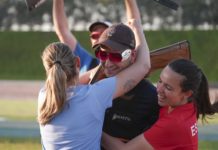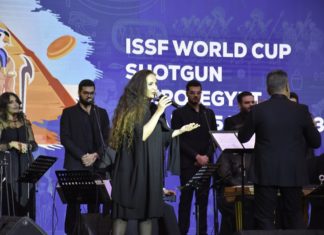
Inspired shooting by 20-year-old Wu Yunxuan helped China win the skeet mixed team gold at the Asian Olympic qualifier in Kuwait as he and Jiang Yiting beat the Kazakhstan pairing of Eduard Yechshenko and Assem Orynbay 45-43.
While there were no quota places to be won in an event that will make its debut at the Paris 2024 Olympics – replacing the trap mixed team event that also made its debut at the Tokyo 2020 Games – there was kudos, and of course an Asian title, to be won.
Wu, the world No.6, missed only one of his 24 shots in what was a new format for the event whereby each shooter took four consecutive shots.
It was a format that clearly required a little getting used to, as at least one shooter stepped away from a station after taking two shots only to be reminded that there were two more to be taken in an event where each shooter would go for a total of 24 targets.
Earlier at the Sheikh Sabah Al-Ahmad Olympic Range in Kuwait City, on what was the final day of competition in the Asia Shotgun Championship, bronze medals were won by Bahrain and India.
Speaking afterwards about the new format, Wu told ISSF TV: “It is a good format, an interesting one. And it suits me.”
He added: “I believed in my partner and did my best for each target and we did it together.”
In the final Yechshenko, the 24-year-old world No.4, matched Wu’s overall performance, but misses by his partner Assem Orynbay, winner of the World Cup final in Doha last November, meant both pairs arrived at the sixth round with China leading 37-35.
Wu bagged all four of his final shots, and when Jiang followed up with another maximum it was all over as China’s total of 45 surpassed the highest possible one for Kazakhstan of 43.
To their credit both Kazakh athletes finished in perfect fashion.
In the first bronze-medal match Qatar’s pair of Masoud Al-Athba and Reem Al Sharshani, who had finished fifth in the women’s final, led the Bahrain team of Tammar Alwatt and Maryam Hassani 21-18 at the halfway point.
But the Bahrain pair restored their fortunes in the second half, with Alwatt hitting all 12 of his final 12 clays and Hassani also proceeding perfectly until the final round.
There she missed her final three shots, but the Bahrain pair still claimed bronze by a score of 39-38.
The second bronze-medal match between the hosts and India 2 generated excitement at the range, particularly when the Kuwaiti pairing of Abdullah Alrashidi and Eman Al Shamaa turned a two point deficit into a one-point lead in a third round where India’s Gurjoat Khangura and 19-year-old individual champion Raiza Dhillon missed three shots between them.
But two faultless rounds restored the Indian fortunes and they finished as 41-39 winners.
The attention now turns to the first of this year’s ISSF World Cups which starts in Cairo on Wednesday (January 24).
Fuente: http://www.issf-sports.org








